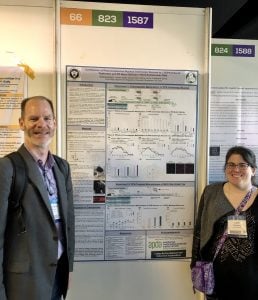Research Progress: APDA-funded research at the International Congress of Parkinson’s Disease and Movement Disorders
I just returned from the International Congress of Parkinson’s Disease and Movement Disorders (MDS) that took place Sept 22-Sept 26, 2019 in Nice, France.
The meeting attracts scientists and clinicians from around the world who work in the field of Parkinson’s disease (PD) and related Movement disorders and is a forum for educational talks, research presentations and networking.
As usual, there was a vast array of PD research presented, covering topics that included clinical trials, epidemiology, non-pharmacologic interventions, non-motor symptoms, neuroimaging, gene- and cell-based therapies and more.
Some of the research featured at the International Congress was presented by APDA-funded researchers. It is always exciting for me to watch as the projects chosen by our Scientific Advisory Board start coming to fruition. And since this research is only possible due to the generous support of our donors, I want to share with you some of the progress our researchers have been making that they presented at MDS:
Christopher Bishop, PhD
Binghamton University, Binghamton, NY

Dr. Bishop’s APDA grant focused on understanding the role of an under-studied, but vital brain region known to be altered in PD called the pedunculopontine tegmental nucleus (PPN).
Dr. Bishop used a well-validated rat model of PD that demonstrates the motor deficits, response to levodopa treatment, and levodopa-induced dyskinesias that are commonly seen in PD patients. These rats were then further manipulated so that the neurons in the PPN that communicate through the brain chemical acetylcholine were either excited or inhibited.
Results showed that when the acetylcholine neurons were excited, motor function of the rats was improved even before levodopa was given, but dyskinesias worsened once levodopa was given. When acetylcholine neurons were inhibited, motor function of the rats worsened, but levodopa induced dyskinesias improved. These experiments demonstrate the importance of the PPN both in the motor symptoms of PD and in the response to levodopa.
In the last set of experiments, a drug was infused into the PPN that affects a specific acetylcholine receptor. These rats showed reduction of levodopa-induced dyskinesias without changing the efficacy of levodopa. These results open the therapeutic possibility of a drug that targets the neurons of the PPN in order to improve patient response to levodopa treatment.
Joseph DeGutis, PhD and Alice Cronin-Golomb, PhD
Boston University School of Medicine, Boston, MA
Attentional Intervention to Improve Cognition and Gait in Parkinson’s Disease: Side of Onset Effects (abstract 839)
Dr. DeGutis and Dr. Cronin-Golomb received an APDA grant to study the impact of attention training on motor and non-motor symptoms of PD. They conducted a clinical trial testing a four-week intervention entitled Tonic and Phasic Attention Training versus usual care that was provided for 36 minutes a day, four days a week. Performance of various measures were assessed before and after training and four weeks after the last session ended. This type of intervention has been used in brain injury patients and is more effective in people with right-sided brain injuries than left-sided brain injuries. Drs. DeGutis and Cronin-Golomb hypothesized that the training would also be more effective in those with PD pathology on the right side of the brain, which correlates to PD symptoms on the left side of the body.

Results of the trial showed improvement in learning and delayed recall in the trained group. On motor scores, improvementswere seen in measures of gait and postural stability. Only patients with left-sided PD symptoms (and not those with right-sided PD symptoms) showed improvement in their total United Parkinson’s Disease Rating Scale, a comprehensive measure of motor function. The results suggest that attention training can potentially lead to improvements in several domains of cognition and in gait and may have more generalized motor effects in those with left-sided PD.
Giulietta Riboldi, MD
NYU Langone Health, New York, NY
Expression profiles from CD14+ monocytes in PD patients with GBA mutations (abstract 473)
Dr. Riboldi received an APDA grant to study the mechanisms by which the glucocerebrosidase (GBA) gene contributes to development of PD. GBA is an enzyme that breaks down a large molecule called glucocerebroside, thereby keeping it from accumulating in cells. Mutations in one (or both) copies of the GBA gene is a genetic risk factor for development of PD. However, only a small percentage of GBA carriers develop the disease and it is not yet clear why some people with the mutation develop it and others do not. This project investigated whether interaction with other genetic modifiers is responsible for how GBA mutations contribute to development of PD in susceptible subjects.
GBA is also important in the immune system found in peripheral blood and many recent studies have suggested a central role of the immune system in PD. Therefore, the project focused on analyzing the differences in the genes expressed in the monocyte, or a particular immune cell found in the blood. Blood samples from four groups were collected: people with PD and GBA mutations; people with PD without GBA mutations; people without PD but with GBA mutations; and people without PD and without GBA mutations.
Comparison of the gene expression profiles of monocytes from each of these four groups showed specific sets of dysregulated genes. Some of the identified genes are involved in mitochondrial function, inflammation, and protein manufacturing and transport. These results propose targets for further study to reveal how GBA is involved in the development of PD.
Read our recent profile of Dr. Riboldi.
Tips & Takeaways
- APDA-funded research is being presented and shared around the world, most recently at the International Congress of Parkinson’s Disease and Movement Disorders in Nice, France.
- APDA-funded researchers are making progress. Each of the studies mentioned above is helping to uncover important aspects of the disease that could lead us to better treatments and eventually a cure.
- APDA is very thoughtful in its grant selection process, choosing only those requests with significant merit.
- The research described above is possible due to the support and generosity of our donors. Click here to help us in this critical mission.
- We encourage you to learn more about all of the research APDA has funded over the years.
